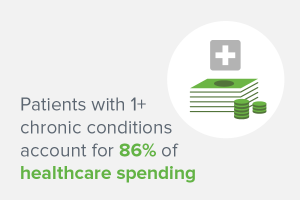 Chronic disease is a leading contributor to high healthcare costs, and employers bear the brunt of the expense. According to the federal Agency for Healthcare Research and Quality, 86% of healthcare spending in the US is for patients with one or more chronic conditions. Controlling — or even preventing — chronic disease in your employees can make a substantial difference in healthcare costs.
Chronic disease is a leading contributor to high healthcare costs, and employers bear the brunt of the expense. According to the federal Agency for Healthcare Research and Quality, 86% of healthcare spending in the US is for patients with one or more chronic conditions. Controlling — or even preventing — chronic disease in your employees can make a substantial difference in healthcare costs.
There is an easy and inexpensive way to move toward this goal: Food. Food as a preventative medicine to keep us healthy. What we eat is the main culprit behind many chronic diseases, and eating a healthier diet helps prevent and treat the most common of these debilitating conditions.
While food cannot replace medication entirely, a healthy diet is the foundation for a healthier workforce and lower healthcare costs. Read on to learn how food as medicine can help improve your employees’ health and quality of life.
The Importance of a Healthy Diet to Wellness
Eating a diet rich in fruits, vegetables, and whole grains is good for both mind and body. These foods bolster our immune systems. They also provide vital nutrients like potassium, fiber, folic acid and vitamins, which are essential for just about every process and function in the body.
Potassium, for example, helps maintain healthy blood pressure. Dietary fiber reduces cholesterol levels in the blood. Folic acid helps the body produce red blood cells, and vitamins are building blocks used throughout the body.
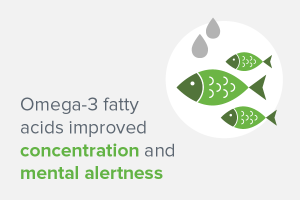 Food also affects mental health. It can protect against spikes in the stress hormone cortisol. It can trigger the release of serotonin, which calms us and is why we turn to some foods for comfort. Foods like leafy greens contain antioxidants that protect brain cells and prevent cognitive decline. Foods like omega-3 fatty acids are associated with improved concentration and mental alertness.
Food also affects mental health. It can protect against spikes in the stress hormone cortisol. It can trigger the release of serotonin, which calms us and is why we turn to some foods for comfort. Foods like leafy greens contain antioxidants that protect brain cells and prevent cognitive decline. Foods like omega-3 fatty acids are associated with improved concentration and mental alertness.
There are a wealth of nutritious options that contribute to a healthy body and mind.
How A Food As Medicine Approach Can Help Prevent Chronic Disease
Fueled by a healthy diet, the body is more resilient. A strong immune system is great for fighting infections short term, but if the immune system is constantly triggered, it can create chronic inflammation. Chronic inflammation is a factor in diabetes, obesity, and diseases of the lung, heart and nervous system. Diets high in fruits, vegetables, legumes, fiber, and certain spices have been shown to suppress chronic inflammation and prevent the development of chronic diseases.
Nutrient-dense foods, in contrast to calorie-dense foods, fill us up and energize us. These fruits, vegetables, and whole grains generally are low in fat, low in sugar and high in fiber, all big pluses for preventing chronic disease. Take the apple, for instance. Its soluble fiber can help lower blood cholesterol levels. Apples also have plenty of phytonutrients that act as antioxidants to counteract chemicals in the blood that damage certain molecules.
On the flip side, the saturated fats and sugars in highly processed foods can trigger a cascade of events that may leave us sleepy, tired and craving more food. High-fat and high-sugar foods contribute to obesity and increase the chance of developing type 2 diabetes. Fatty acids can trigger insulin resistance, which can lead to abnormally high blood sugar levels, a sign of diabetes. Saturated fat raises cholesterol levels, which builds up as plaque inside the blood vessels, which can then break free, block an artery and trigger a heart attack or stroke.
Piling on the leafy greens, crunching on carrots or snacking on that apple can do wonders for preventing or slowing the development of chronic disease.
Healthy Food Choices for Specific Diseases
Some diseases are particularly responsive to changes in diet. Two of the most common are diabetes and heart disease.
For people with diabetes, living well means keeping blood sugar levels in a normal range. Too much sugar in the blood and they risk damaging their kidneys, eyes and vascular system. Too little, and they could pass out or slip into a diabetic coma. There is an abundance of research that shows how managing diet is essential for sustaining healthy blood sugar levels.
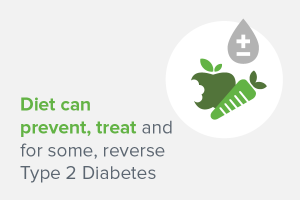 There is also strong evidence that diet can prevent, treat and for some, reverse, type 2 diabetes. One analysis of more than 40 studies on nutrition therapy for diabetics found strong evidence that utilizing food as medicine everyday is effective for improving glycemic control in people with diabetes. Nutrition therapy was particularly effective for those with prediabetes and those newly diagnosed with diabetes.
There is also strong evidence that diet can prevent, treat and for some, reverse, type 2 diabetes. One analysis of more than 40 studies on nutrition therapy for diabetics found strong evidence that utilizing food as medicine everyday is effective for improving glycemic control in people with diabetes. Nutrition therapy was particularly effective for those with prediabetes and those newly diagnosed with diabetes.
Another study investigated a low-fat plant-based diet that was found to have a significant impact on body mass index (BMI), cholesterol and blood sugar, which contribute to obesity, heart disease and diabete. The diet included starches, such as potatoes and pasta. Participants were not limited in how much they ate and were not required to exercise. Despite the lack of calorie limits or exercise, the intervention group saw greater weight loss than the control group.
There’s additional evidence that diet is a powerful approach for preventing heart disease. One large study found that those who ate a diet heavy on vegetables and whole foods had significantly lower risk for heart disease than than those who ate a typical Western diet of red meat, desserts, french fries and high-fat dairy products.
Diet is so important when it comes to heart disease that the National Heart, Lung, and Blood Institute, developed the Dietary Approaches to Stop Hypertension (DASH) diet plan. High blood pressure is a major contributor to heart disease. The DASH diet is intended to help manage hypertension without medication or as a supplement to medication. It emphasizes vegetables, fruits and low-fat dairy foods, including foods rich in nutrients that help lower blood pressure, like potassium, calcium and magnesium. It also includes moderate amounts of whole grains, fish, poultry and nuts, and is low in salt.
On this diet, some see results within two weeks, according to the National Heart, Lung and Blood Institute. Many people who were dependent on high blood pressure medication can be weaned off it entirely by following DASH.
Diabetes and heart disease are life-altering conditions, and without medical and diet intervention they can cause permanent bodily harm. Nutrition is a key component in both preventing these illnesses, and treating them in those already afflicted.
What Makes a Healthy Diet? The Science of Medicinal Foods
 There are specific diets proven to have a powerful impact on wellness, diets that have passed the test of time and science. Their impact is so compelling in promoting health and preventing common diseases that they have contributed to the emerging concept of food as medicine.
There are specific diets proven to have a powerful impact on wellness, diets that have passed the test of time and science. Their impact is so compelling in promoting health and preventing common diseases that they have contributed to the emerging concept of food as medicine.
The common thread in these food as medicine diets are fruits, vegetables, and whole grains―and lots of them. Whether you go all in or make a small change, eating more of these foods can bring meaningful results. One Harvard study found merely swapping out eggs for oatmeal at breakfast can help you live longer.
For those who are willing to go all in, a plant-based diet can help you be healthier and live longer. A large study in JAMA Internal Medicine found that those who had a high intake of protein from plants had a lower risk of death than those who got their protein primarily from processed and unprocessed red meats.
A plant-based diet encourages eating nutrient-dense vegetables, fruits, legumes, seeds, and nuts in their whole form. For maximum benefit, processed foods, oils, and animal foods are limited.
The benefits of such a diet are compelling enough that one of the largest managed care organizations in the U.S., Kaiser Permanente, is encouraging its physicians to make a plant-based diet the “new normal” for patients. Citing a string of studies as proof points, Kaiser says that plant-based diets are cost-effective, low-risk interventions that may lower BMI, blood pressure, blood sugar, and cholesterol levels. They may also reduce the number of medications needed to treat chronic diseases and lower the risk of death from heart disease.
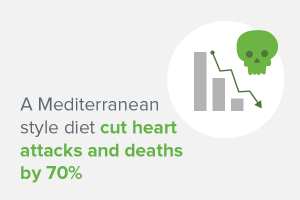 A Mediterranean diet is another with heavy backing from the scientific community. It has proven to be effective at reversing diabetes, dramatically reducing the risk of heart attacks, and out-performing low-fat diets for weight loss.
A Mediterranean diet is another with heavy backing from the scientific community. It has proven to be effective at reversing diabetes, dramatically reducing the risk of heart attacks, and out-performing low-fat diets for weight loss.
Along with a wealth of fruits, vegetables, nuts, and whole grains, this diet includes a moderate amount of fish and poultry, a low amount of dairy, red meat, and sweets, and the occasional glass of red wine. Olive oil, a monounsaturated fat, is allowed, which has been found to be good for the heart as well as for improving insulin sensitivity.
Harvard researchers reported that a Mediterranean-style diet cut heart attacks and deaths by 70%. Another study in the journal Neurology found this diet may keep the brain healthier longer, reducing the risk of stroke, dementia and Alzheimer’s.
For most of us, eating healthy food is more appealing than taking most medications. Medication treats risk factors. Food treats the underlying causes of those risks. An apple a day — plus some broccoli and cauliflower — truly does keep the doctor away.
Workplace Wellness: The Science Behind Healthier Eating
What people chose to eat is often influenced more by how foods are arranged on a buffet, on grocery store shelves, on a menu, or in the corporate café, than by its nutritional value. Influencing those food choices to create lasting change is as important as helping people understand the benefits of a healthy diet.
The food landscape can be deliberately designed to encourage certain choices. University of Oxford scientists found that sales of healthy foods increased when they were placed closer to the cash register. A Stanford study found that labeling vegetables with indulgent-sounding descriptions led to more people buying them. Smaller plates and smaller serving spoons can help people eat smaller portions. All of these situations illustrate how the food landscape influences what people chose to eat. It’s less about “eat this, don’t eat that” prescriptive advice and more about encouraging healthy behaviors by influencing choices.
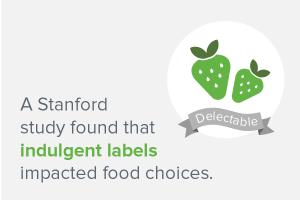 A corporate wellness program with a nutrition component based on behavioral science helps equip employees to succeed. Zipongo is a digital nutrition platform that works with employers to improve the health of their employees. The platform includes a mobile app that seamlessly integrates into your employee’s lifestyle, offering guidance for nearly every food choice they make in a day.
A corporate wellness program with a nutrition component based on behavioral science helps equip employees to succeed. Zipongo is a digital nutrition platform that works with employers to improve the health of their employees. The platform includes a mobile app that seamlessly integrates into your employee’s lifestyle, offering guidance for nearly every food choice they make in a day.
When they face food choices at home, work, grocery stores, restaurants, or in the homes of family and friends, the app provides healthy cues and triggers to replace the flood of unhealthy ones. It transforms food and nutrition data into a personalized recipe library, along with grocery store lists and restaurant mini-menus, so that the easiest food choices are the healthiest ones.
Food is medicine. What’s more, it’s powerful medicine, with scientifically-proven effectiveness. But encouraging your employees to follow their food prescription takes more than calorie counting or weight loss contests. Nutrition needs to be a central pillar of your corporate wellness program, with a behavioral science based approach to influencing eating habits.
